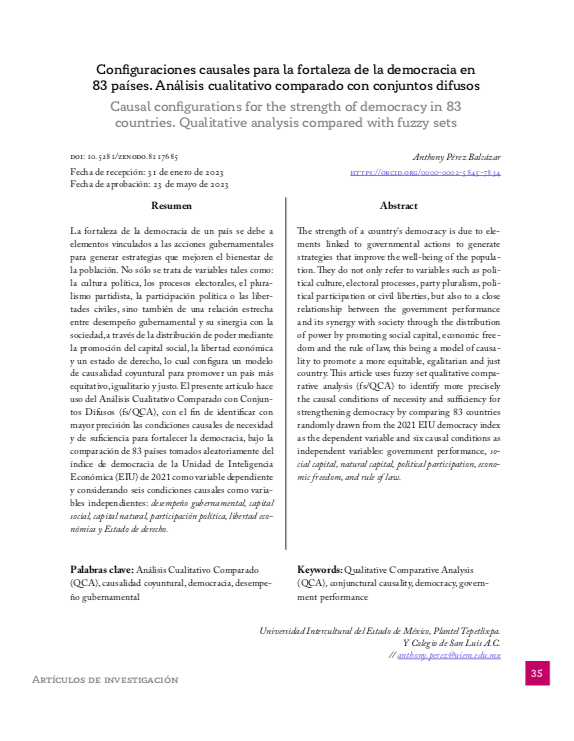Abstract
The strength of democracy is related to government performance and its synergy with society through the distribution of power by promoting social capital, economic freedom and the rule of law. For this reason, the article makes use of the Comparative Qualitative Analysis (fs/QCA) in order to identify the causal conditions of necessity and sufficiency to strengthen democracy under the comparison of 83 countries randomly taken from the EIU democracy index of 2021 and six causal conditions; government performance, social capital, natural capital, political participation, economic freedom and rule of law.
References
Caramani, D. (2005). The Formation of national party systems in Europe: A comparative-historical analysis. Scandinavian Political Studies, 28, pp. 295-322. https://doi.org/10.1111/j.1467-9477.2005.00134.x
Cheibub, J., Gandhi, J. y Vreeland, J. (2010). Democracy and dictatorship revisited. Politic Choice, Vol. 143, SPRINGER. Politic Choice, 143, pp. 67-101. https://www.jstor.org/stable/40661005
Coleman, J. (1988). Social Capital in The Creation of Human Capital. The American Journal of Sociology, 94, University of Chicago Press.
Diamond, L. (2002). Elections Without Democracy: Thinking About Hybrid Regimen, Journal of Democracy. Johns Hopkins University Press, 13(2), pp. 21-35.
Economic Intelligence Unite. (2021). Democracy index. The China Challenge, London, United Kingdom. Editorial EIU. https://www.eiu.com/n/campaigns/democracy-index-2021/
Grzymala-Busse, A. (2013). Why There is (Almost) No Christian Democracy in Post Communist Europe. Party Politics 19(2), pp. 319-342. https://www.ires.uu.se/digitalAssets/658/c_658254-l_3k_anna_grzymalabusse_why_there_is_almost_no_christian_democracy_in_eatern_europe.pdf
Gwartney, J., et al. (2021). Economic Freedom of the World, FRASER Institute. https://www.fraserinstitute.org/studies/economic-freedom-of-the-world-2021-annual-report
Kitschelt, H. y Kselman, D. (2012). Economic Development, Democratic Experience and Political Parties. SAGE. Comparative Political Studies, 46, pp. 1453-1484. https://doi.org/10.1177/0010414012453450
Miller, T. et al. (2021). Index of Economic Freedom 2021, The Heritage Fundation. https://www.heritage.org/index/
Medina, Iván, et al. (2017). Análisis cualitativo comparado. Cuadernos metodológicos. Centro de Investigaciones Sociológicas.
Pérez-Liñan, A. (2010). El método comparativo y el análisis de configuraciones causales. Revista Latinoamericana de Política Comparada, 3.
Putnam, R. (1993). Democracy work. Civic traditions in modern Italy, Princeton University Press.
Ragin, C. (2008). Redesigning Social Inquiry. Fuzzy Sets and Beyond, The University of Chicago Press.
Ragin, C. y Rihoux, B. (2004). Qualitative Comparative Analysis (QCA): State of the Art and Prospects. Qualitative Methods, 2(2), 3-13. https://zenodo.org/record/998222#.ZEGIPXbMK3A
Rodríguez-Modroño, P. (2012). Análisis Relacional del Capital Social y el Desarrollo de los Sistemas Productivos Regionales. REDES. Revista Hispana para el análisis de Redes Sociales, 23, 9, Universidad Autónoma de Barcelona. https://raco.cat/index.php/Redes/article/view/264613
Schneider, C. y Wagemann C. (2012). Set Theoretic Methods for the Social Sciences. A Guide to Qualitative Comparative analysis, CAMBRIGE.
SolAbility. (2020) The Global Sustainable Competitiveness Index 2020. SolAbility Susteinable Inteligence, Zurich, Seoul. www.solability.com
Tavits, M. y Letki, N. (2014). From Values to interests? The Evolution of Party Competition in New Democracy. The Journal of Politic, 76, 246-258. https://www.journals.uchica-go.edu/doi/abs/10.1017/S002238161300131X?journalCode=jop
WJP. (2021). World Justice Project. Rule of Law Index 2021. Washington, DC. USA. https://worldjusticeproject.org/rule-of-law-index/global/2021/
Recursos electrónicos para el índice de participación política:
The transformation index. BTI. (2021). https://btiproject.org/en/?&cb=00000
Software de soporte de análisis para conjuntos difusos: https://www.socsci.uci.edu/~cragin/fsQCA/software.shtml

This work is licensed under a Creative Commons Attribution-NonCommercial-ShareAlike 4.0 International License.
Copyright (c) 2023 Albores


